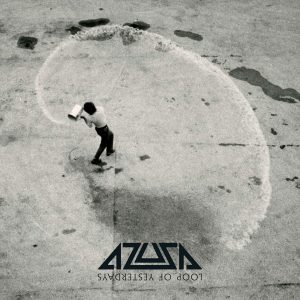I’m breaking form here and posting about an album that came out yesterday (rather than taking a week or two to review all the new music of interest before posting). I’ve still got plenty of other reviews to write from the past couple weeks of releases, which I’ll be getting to soon, but this album deserves immediate attention.

Azusa is a project started by cousins and Extol co-founders Christer Espevoll (guitar) and David Husvik (drums). To complete the lineup, they recruited Liam Wilson (bassist of Dillinger Escape Plan, and my bandmate in John Frum), and singer Eleni Zafiriadou of Sea + Air (an indie rock band, in which she just sings, but in Azusa, we hear that damn, can she scream, too). To my ears, the band is the spiritual successor to Extol’s 2003 album, Synergy–a natural evolution from that sound. In fact, some of the musical seeds of Azusa’s first album date back to the Synergy era. (Full disclosure: Synergy is my 2nd favorite album of all-time, and when Azusa’s first album, Heavy Yoke (2018), came out, I was beyond excited to hear some of my favorite musicians continuing the sound of my favorite album.)
Loop of Yesterdays is the perfect second album. It retains the spirit of Heavy Yoke and Synergy, but also evolves beyond that sound, bringing in new elements to present its own unique artistic statement. You know the cliche description of an album that “perfectly balances melody and aggression, harmony and dissonance” and then you roll your eyes? Well, this is that, except better than anything else ever described like that, and in a more unique way than any other melodic heavy band.
In somewhat broader terms, this is technical, progressive thrash metal. The metal elements are melded with softer, melodic passages reminiscent of jazz-influenced progressive death metal bands of the 90s, like Believer (one of Espevoll and Husvik’s biggest early influences), Pestilence, and Cynic. Dig a little deeper, though, and there’s much more that doesn’t sound like any other band. First of all, Zafiriadou is an incredibly versatile vocalist. Her melodic singing, including some beautiful harmonies, can be soft, graceful, and dreamy, or forceful and strong; and her screaming is vicious, throaty, and full of feeling in a harcore kind of way. She’s one of the best female vocalists in all of metal.
Behind Zafiriadou’s comanding presence, is a musical style that could come from no one else than Espevoll and Husvik. That sound, recognizable to anyone familiar with Extol, makes up a large portion of the compositions, but some of the more melodic parts have an extra color that was not previously present in past Azusa or Extol releases. It’s unusual and unlike anything I’ve ever heard from a metal band.
Much to its advantage, the production of the album is warm and natural, not ultra-clean and sterile like a lot of modern metal. Wilson’s bass tone is thick, sharp, and appropriately present, Espevoll’s guitars have the perfect balance of crunch and clarity, and Husvik’s drums pound and crack with a very live presence.
Azusa packs a whole lot of ideas into 36 minutes, though it’s not at all overstuffed. It’s a lean record, with sections that go by quickly, but contain great musical depth. This makes it easy to listen multiple times in a row, and to notice new things every time. Listeners can expect to hear the following in any one song: crushing thrash riffs; dreamy sections that texturally share much in common with indie rock, but the chords and melodies are much stranger; dexterous palm-muted guitar picking; spiraling guitar and bass melodies; highly advanced harmonic structures that you’d need to either slow down, or listen to three times in a row to fully appreciate the nuances; and drumming that is creative and melodic in its own unique way, but also simple and direct when the part calls for it.
There are many highlights: “Detach” is already a crushing song on its own, but then Testament guitarist Alex Skolnick’s unhinged guest solo brings the end of the song to new heights; “Monument” is a prime example of how succinct and poignant Azusa’s songwriting is. It starts out with a hardcore toughness, then opens up to a chorus that is brief but magical, with expertly composed vocal and guitar melodies. “Rapture Boy” contains the kind of classic Extol riffage that made them one of my favorite bands 20 years ago. It’s exciting that these musicians, who have already made so much incredibly unique music, continue to grow as composers, uncovering new musical colors 22 years after the first Extol album. Loop of Yesterdays is a strong contender for album of the year. — 9.6/10